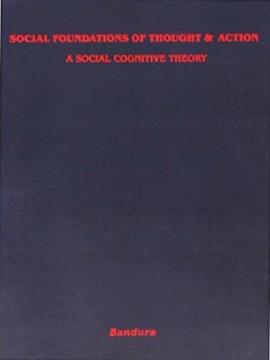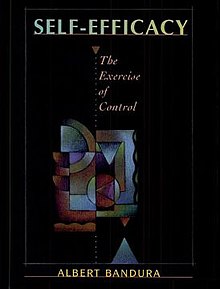
Albert Bandura was a Canadian–American psychologist who was the David Starr Jordan Professor Emeritus of Social Science in Psychology at Stanford University.
Social learning is a theory of learning process social behavior which proposes that new behaviors can be acquired by observing and imitating others. It states that learning is a cognitive process that takes place in a social context and can occur purely through observation or direct instruction, even in the absence of motor reproduction or direct reinforcement. In addition to the observation of behavior, learning also occurs through the observation of rewards and punishments, a process known as vicarious reinforcement. When a particular behavior is rewarded regularly, it will most likely persist; conversely, if a particular behavior is constantly punished, it will most likely desist. The theory expands on traditional behavioral theories, in which behavior is governed solely by reinforcements, by placing emphasis on the important roles of various internal processes in the learning individual.

The illusion of control is the tendency for people to overestimate their ability to control events. It was named by U.S. psychologist Ellen Langer and is thought to influence gambling behavior and belief in the paranormal. Along with illusory superiority and optimism bias, the illusion of control is one of the positive illusions.
Expectancy theory proposes that an individual will behave or act in a certain way because they are motivated to select a specific behavior over others due to what they expect the result of that selected behavior will be. In essence, the motivation of the behavior selection is determined by the desirability of the outcome. However, at the core of the theory is the cognitive process of how an individual processes the different motivational elements. This is done before making the ultimate choice. The outcome is not the sole determining factor in making the decision of how to behave.
Agency is the capacity of an actor to act in a given environment. It is independent of the moral dimension, which is called moral agency.
The psychology of learning refers to theories and research on how individuals learn. There are many theories of learning. Some take on a more behaviorist approach which focuses on inputs and reinforcements. Other approaches, such as theories related to neuroscience and social cognition, focus more on how the brain's organization and structure influence learning. Some psychological approaches, such as social constructivism, focus more on one's interaction with the environment and with others. Other theories, such as those related to motivation, like the growth mindset, focus more on individuals' perceptions of ability.
Goal setting involves the development of an action plan designed in order to motivate and guide a person or group toward a goal. Goals are more deliberate than desires and momentary intentions. Therefore, setting goals means that a person has committed thought, emotion, and behavior towards attaining the goal. In doing so, the goal setter has established a desired future state which differs from their current state thus creating a mismatch which in turn spurs future actions. Goal setting can be guided by goal-setting criteria such as SMART criteria. Goal setting is a major component of personal-development and management literature. Studies by Edwin A. Locke and his colleagues, most notably, Gary Latham have shown that more specific and ambitious goals lead to more performance improvement than easy or general goals. The goals should be specific, time constrained and difficult. Vague goals reduce limited attention resources. Unrealistically short time limits intensify the difficulty of the goal outside the intentional level and disproportionate time limits are not encouraging. Difficult goals should be set ideally at the 90th percentile of performance,assuming that motivation and not ability is limiting attainment of that level of performance. As long as the person accepts the goal, has the ability to attain it, and does not have conflicting goals, there is a positive linear relationship between goal difficulty and task performance.

The Theory of Planned Behavior (TPB) is a psychological theory that links beliefs to behavior. The theory maintains that three core components, namely, attitude, subjective norms, and perceived behavioral control, together shape an individual's behavioral intentions. In turn, a tenet of TPB is that behavioral intention is the most proximal determinant of human social behavior.
In psychology, self-efficacy is an individual's belief in their capacity to act in the ways necessary to reach specific goals. The concept was originally proposed by the psychologist Albert Bandura.

Confidence is the state of being clear-headed: either that a hypothesis or prediction is correct, or that a chosen course of action is the best or most effective. Confidence comes from the Latin word fidere which means "to trust". In contrast, arrogance or hubris is a state of unmerited confidence—belief lacking evidence and/or a reason. Overconfidence or presumptuousness is excessive belief in success without regard for potential failure. Confidence can be a self-fulfilling prophecy, as those without it may fail because they lack it, and those with it may succeed because they have it rather than because of an innate ability or skill.
Reciprocal determinism is the theory set forth by psychologist Albert Bandura which states that a person's behavior both influences and is influenced by personal factors and the social environment. Bandura accepts the possibility that an individual's behavior may be conditioned through the use of consequences. At the same time he asserts that a person's behavior can impact the environment.
Social cognitive theory (SCT), used in psychology, education, and communication, holds that portions of an individual's knowledge acquisition can be directly related to observing others within the context of social interactions, experiences, and outside media influences. This theory was advanced by Albert Bandura as an extension of his social learning theory. The theory states that when people observe a model performing a behavior and the consequences of that behavior, they remember the sequence of events and use this information to guide subsequent behaviors. Observing a model can also prompt the viewer to engage in behavior they already learned. In other words, people do not learn new behaviors solely by trying them and either succeeding or failing, but rather, the survival of humanity is dependent upon the replication of the actions of others. Depending on whether people are rewarded or punished for their behavior and the outcome of the behavior, the observer may choose to replicate behavior modeled. Media provides models for a vast array of people in many different environmental settings.
Behavioural change theories are attempts to explain why human behaviours change. These theories cite environmental, personal, and behavioural characteristics as the major factors in behavioural determination. In recent years, there has been increased interest in the application of these theories in the areas of health, education, criminology, energy and international development with the hope that understanding behavioural change will improve the services offered in these areas. Some scholars have recently introduced a distinction between models of behavior and theories of change. Whereas models of behavior are more diagnostic and geared towards understanding the psychological factors that explain or predict a specific behavior, theories of change are more process-oriented and generally aimed at changing a given behavior. Thus, from this perspective, understanding and changing behavior are two separate but complementary lines of scientific investigation.
Personal development or self-improvement consists of activities that develop a person's capabilities and potential, build human capital, facilitate employability, enhance quality of life, and facilitate the realization of dreams and aspirations. Personal development may take place over the course of an individual's entire lifespan and is not limited to one stage of a person's life. It can include official and informal actions for developing others in roles such as teacher, guide, counselor, manager, coach, or mentor, and it is not restricted to self-help. When personal development takes place in the context of institutions, it refers to the methods, programs, tools, techniques, and assessment systems offered to support positive adult development at the individual level in organizations.
Moral disengagement is a meaning from social psychology for the process of convincing the self that ethical standards do not apply to oneself in a particular context. This is done by separating moral reactions from inhumane conduct and disabling the mechanism of self-condemnation. Thus, moral disengagement involves a process of cognitive re-construing or re-framing of destructive behavior as being morally acceptable without changing the behavior or the moral standards.
Sport psychology was defined by the European Federation of Sport Psychology (FEPSAC) in 1996, as the study of the psychological basis, processes, and effects of sport. Otherwise, sport is considered as any physical activity where the individuals engage for competition and health. Sport psychology is recognized as an interdisciplinary science that draws on knowledge from many related fields including biomechanics, physiology, kinesiology and psychology. It involves the study of how psychological factors affect performance and how participation in sport and exercise affect psychological and physical factors. Sport psychologists teach cognitive and behavioral strategies to athletes in order to improve their experience and performance in sports.

Social Foundations of Thought and Action: A Social Cognitive Theory is a landmark work in psychology published in 1986 by Albert Bandura. The book expands Bandura's initial social learning theory into a comprehensive theory of human motivation and action, analyzing the role of cognitive, vicarious, self-regulatory, and self-reflective processes in psychosocial functioning. Bandura first advanced his thesis of reciprocal determinism in Social Foundations of Thought and Action.
Academic achievement or academic performance is the extent to which a student, teacher or institution has attained their short or long-term educational goals. Completion of educational benchmarks such as secondary school diplomas and bachelor's degrees represent academic achievement.
Alex Stajkovic is an Organizational Behavior (OB) professor who has conducted research on confidence and goal priming. He holds the Dean's Professorship in Business at the Wisconsin School of Business at the University of Wisconsin - Madison. His research bears on self-efficacy, confidence, and primed goals. Stajkovic co-authored papers with Albert Bandura, Edwin Locke, and Fred Luthans. Stajkovic is a contributing editor to the Journal of Applied Psychology, as well as a member of the Midwestern Psychological Association and Society for Science of Motivation.

Coaching psychology is a field of applied psychology that applies psychological theories and concepts to the practice of coaching. Its aim is to increase performance, self-actualization, achievement and well-being in individuals, teams and organisations by utilising evidence-based methods grounded in scientific research. Coaching psychology is influenced by theories in various psychological fields, such as humanistic psychology, positive psychology, learning theory and social psychology.






